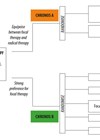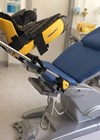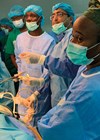Features archive for 2020
PROFILE study seeks to find out why black men develop prostate cancer at twice the rate of other men
A first-of-its-kind study in the UK is aiming to solve the mystery of why black men develop prostate cancer at twice the rate of other men. Funded by Prostate Cancer UK in partnership with Movember, the PROFILE study will look...
Focal therapy trials
Men with localised prostate cancer have traditionally required whole gland treatment involving radical prostatectomy or radical radiation treatment, independent of disease location and size. Increasing evidence supports the use of active treatment only in those men diagnosed with prostate cancer...
Establishing a new TPPBx service during the COVID-19 pandemic
COVID-19 had a major impact on our hospital services from early in the pandemic, with almost three times as many patients being ventilated compared to the normal ITU capacity at the beginning of April. During the build-up to this point,...
Penile cancer: a practical approach
Penile cancer is rare and accounts for less than 1% of all new cancer cases in males in the UK, with around 640 new cases diagnosed every year [1]. In England and Wales, the annual incidence is between 1.2 and...
REPORT: Urology News Patient Engagement Evenings
Towards the end of 2019 the team at Urology News began making plans for our first event. An educational study day focusing on how to improve patient engagement in urology was to be held in Edinburgh at the end of...
Bike4TUF goes local to raise vital funds and support patients
There was no stopping urologists from raising vital funds for charity as they cycled more than 2000 miles to support The Urology Foundation (TUF). The annual Bike4TUF event saw 24 participants cycle in teams of six across Manchester, Canterbury, London,...
COVID-19 cuts prostate cancer referrals in half
Charity warns that 3500 men risk being diagnosed with incurable cancer as referrals drop to lowest in 10 years Urgent referrals for urological cancers have dropped by half in England (49.5%) compared to the same period last year as the...
Bladder cancer diagnosis and follow up: A new proven urinary biomarker to support the post COVID-19 recovery phase
Since lockdown began most urologists have been following the advice of BAUS Oncology, to minimise the risk of exposure of patients and staff to potential COVID-19 infection: the result is an increasing backlog of patients requiring tests to determine if...
‘One team’: our experience teaching catheter care and difficult urethral catheterisation to NHS Nightingale Hospital London volunteer staff members
The NHS Nightingale Hospital London was launched in response to the COVID-19 pandemic. In mid-March 2020, the predicted scale of the pandemic was uncertain and there was concern that COVID-19 might overwhelm existing intensive care unit (ICU) capacity within weeks....
Delivering a laparoscopic urology workshop in West Africa: our initial experience in Senegal
Despite universal adoption and significant technological innovation since its inception around 30 years ago, access to laparoscopic surgery remains lacking in Sub-Saharan Africa (SSA). Whilst some progress has been made in recent years to bridge the gap with the developed...
A greener urology
Healthcare in England is responsible for 4-5% of the country’s carbon footprint which is defined as the amount of greenhouse gasses, primarily carbon dioxide, released into the atmosphere by a particular activity. The six greenhouse gasses which vary in their...
The transition from surgeon to manager during the COVID-19 response
Writing this article on the first Sunday in May, when in any other year, I would be wearing my bowler hat in Hyde Park for the annual Cavalry Memorial Parade, a time ‘pre-COVID’ does seem a very distant memory. Having...















